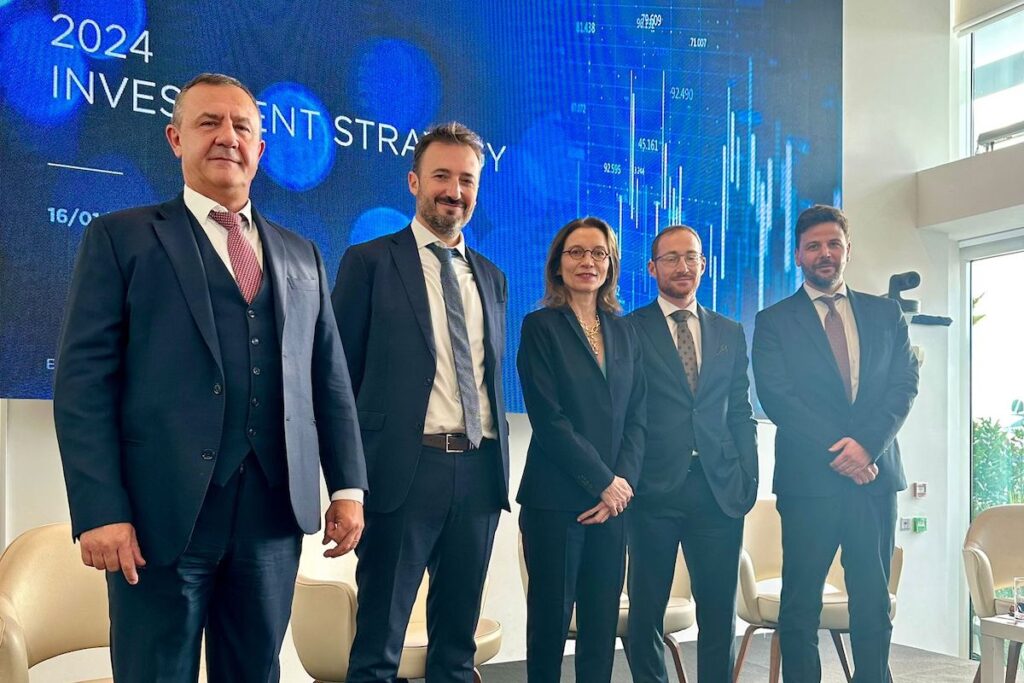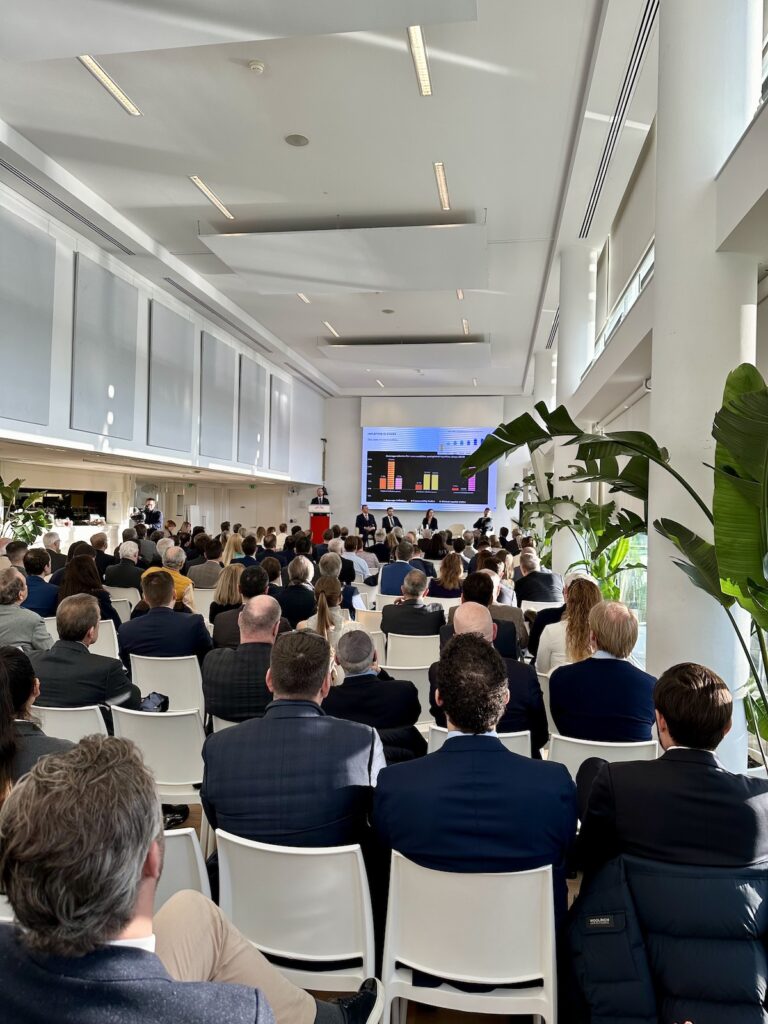2024 outlook for world economy: Mathilde Lemoine, Chief Economist at Edmond de Rothschild Group

Elections, AI, innovation, post-covid recovery… Mathilde Lemoine broached a number of topics at the annual investment strategy conference organised by Edmond de Rothschild Monaco.
Monaco’s Yacht Club was packed on Tuesday 16 January. As every year, the Edmond de Rothschild Monaco bank organised a conference to discuss the group’s investment strategy for the new year. Gérard Ohresser, Chief Executive Officer, Mathilde Lemoine, Group Chief Economist, Sébastien Cavernes, Chief Investment Officer, Lucas Cirimbilli, Head of Investment Advisory, and Michael Menella, Head of Private Banking, all spoke about prospects for 2024.
Mathilde Lemoine pointed out that 2023 had been marked by a slowdown in inflation. “Inflation fell to 2.9% in December in the euro zone and 3.4% in the United States, compared with 8.6% and 6.4% respectively in January last year. This is due to a tightening of monetary policies, which have been extremely aggressive and restrictive,” she said, before turning to growth, which is particularly strong in the United States.
“Growth in the first three quarters of 2023 reached 2.3%, which is a remarkable performance! In China, the figure was 5.2%. (…) Unfortunately, the euro zone is struggling to maintain resilience, with growth of just 0.6%.”
In terms of forecasts, 2024 is likely to see a slowdown, all over the world. “The post-pandemic impacts have been massive,” says Mathilde Lemoine. “In the United States, consumer goods sales are still much higher than before the pandemic. This explains over-consumption, changes to production structures, changes to governments’ supply chains, as they look to reshore and friendshore*… This also results in services constantly ‘playing catch-up’ and is generating a particularly sharp upturn in wages, especially in the hotel sector.”
Poorer education and training
However, Mathilde Lemoine stressed the long-term consequences of a slump in education and training, particularly since the covid-19 pandemic. This is borne out by PISA, the Programme for International Student Assessment. “The pandemic has had a negative impact on learning and skills development at school and university, and for employees, who had to postpone training. We need to factor this into our macroeconomic scenarios and our investments, because it will result in a reduced capacity for businesses to generate profits. The macroeconomic consequences of the pandemic cannot be underestimated,” she says.
2024 will also see a record number of elections, including the US presidential elections and the European elections in particular. This year, 4.2 billion people – half the world’s population – will be invited to cast their vote. “How can we make economic forecasts given the electoral context? We need to define the key aspects that are common to all the elections, and could have a major impact on our results and our expectations for 2024,” says Mathilde Lemoine.

As things stand, economists are anticipating a potential risk premium rise due to the uncertainties over these elections, uncertainties that may weigh on corporate investment in the countries concerned. “Whatever the election, there is however a consensus on post-covid policies,” says Mathilde Lemoine. “Some countries, such as the United States, have decided to support investment in order to give domestic companies greater independence, particularly with regard to China. The USA is trying out new partnerships, in particular with the Netherlands and Japan, to reach agreements that will secure electronic component supplies. Europe, on the other hand, is falling behind. The other common aspect, whatever the outcome of the elections, is the end of the rate hike cycle, which gives central banks a certain amount of leeway. Finally, there is competition for investment with the energy transition, business development, investments to do with cyber attacks, etc., which all governments support. It’s the electoral cycle: public spending never falls before an election. Other types of risk will come to the fore in 2025, however. For example, the increase in customs duties promised by Donald Trump if he is elected. In Europe, there is a lack of support for private investment, and that is a problem.”
Mathilde Lemoine expanded on these points in an interview with us after the presentation.
How do you explain the fact that growth in the euro zone is weaker than elsewhere?
ML: I can think of several reasons. Firstly, the European Union, like the United States, had announced post-pandemic recovery plans. Compared with the very high amounts that were planned, particularly with the Next Generation EU plan [set at €750 billion, Ed.], disbursements have been really, really slow, with the exception of Spain, which spent €40 billion very quickly. In fact, Spanish growth has been much more dynamic than in the northern countries, which are failing to come up with the right investment projects to finance. And they are not experiencing the same growth.
Also, productivity is much lower in Europe than in the United States. The added value produced by employees is lower, and businesses are making less profit with which to invest or expand, as American companies are able to do.

The third reason is innovation. Contrary to what we might think, the workforce’s average skillset, and overall employee skills, are better in America than in Europe. Innovation therefore spreads faster and farther, boosting the economy as a whole.
In addition, the European Central Bank (ECB) has had to follow the US Federal Reserve, which has exported its post-pandemic inflation. The ECB therefore had to raise rates before the Russian-Ukrainian conflict, which was inconsistent with the euro zone’s weak economic position.
Some people regret a “brain drain” of talent to the United States. Could this explain Europe’s lack of innovation?
ML: Yes, not to mention the fact that European companies are not financed via the markets and find it difficult to raise capital. But brain drain aside, Europe trains few skilled people. Let’s not forget the Lisbon strategy, in 2000, which aimed to make Europe “the most competitive and dynamic knowledge-based economy in the world” ten years later. For the past 24 years, most European countries have been short of qualified people, which means less social cohesion. I find it totally baffling: how can we leave students, young people, who have endured poor learning environments, with no chance of catching up? In an article I wrote for Les Echos, I urged this to be the focus of a European plan. We also need to learn lessons from the pandemic about Europe’s dependence on China.
What impact could current international conflicts have on the economic outlook?
ML: The important thing is to frame macroeconomics in the light of redrawn global lines. The international balance of power has shifted away from the China-US axis, which has changed the situation, particularly since 2017, and has led to a strengthening of US positions in Asia, outside China. It’s very striking. The United States is back on the international stage! Its contribution to global growth is now around 22%, which is a historic high. “Latin America vs China” flows have also grown. Conflicts have to be considered in the light of this reconfiguration. Let’s take the example of the conflict in Ukraine: on the one hand, we are seeing an increase in energy prices, and on the other the development of gas supplies from the Middle East. This is contributing to the development of the UAE.
Conflict situations lead to an increase in military spending. The American elections will play a very important role. The most difficult thing to anticipate would be Donald Trump’s plans for the United States to leave NATO. It would create a climate of uncertainty and would have a very negative impact on global growth.
Do you see AI as an opportunity or a threat to the economy?
ML: We need to train employees, so that they can take it on board, and legislate on AI-related innovations. Their development needs to be regulated. Many econometric studies show that routine jobs will be the hardest hit. Unskilled workers suffered the negative effects more than skilled personnel during the previous wave of globalisation and innovation, Today, it’s ‘routine’ versus ‘non-routine’. For example, someone who observes the markets is at risk of losing their job, because it is routine. On the other hand, someone who provides insights, and therefore makes hypotheses, is more secure. European governments should set up transition funds. This could enable employees or employers who are in difficulties to be trained for other tasks.
There are innovations at every level, whatever the qualifications, and that’s what drives growth. In Europe we have technology “hotspots”, like start-ups, but unfortunately they are exported or bought out… There is little or no notion of federalism, whereas that is very prevalent in the United States. With less demand, companies are investing less, except to export outside Europe. This is a cyclical factor. Whereas the productivity problem is a structural issue.
*Reshoring: relocating a business to its original location.
Friendshoring: relocating to allied countries, depending on the geopolitical situation.













